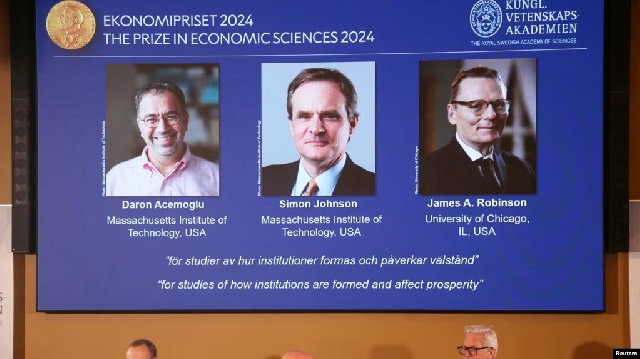Nobel economics prize awarded for research into why countries succeed or fail
 Academy of Sciences members of the Nobel Assembly at the Swedish Riksbank announce the Swedish Riksbank's prize in economic science, which goes to Daron Acemoglu, Simon Johnson and James A. Robinson, during a press meeting in Stockholm, Oct. 14, 2024
Academy of Sciences members of the Nobel Assembly at the Swedish Riksbank announce the Swedish Riksbank's prize in economic science, which goes to Daron Acemoglu, Simon Johnson and James A. Robinson, during a press meeting in Stockholm, Oct. 14, 2024
The Nobel memorial prize in economics was awarded Monday to Daron Acemoglu, Simon Johnson and James A. Robinson for research into reasons why some countries succeed and others fail.
The Nobel memorial prize in economics was awarded Monday to Daron Acemoglu, Simon Johnson and James A. Robinson for research into differences in prosperity between nations.
The three economists "have demonstrated the importance of societal institutions for a country's prosperity," the Nobel committee of the Royal Swedish Academy of Sciences said at the announcement in Stockholm.
"Societies with a poor rule of law and institutions that exploit the population do not generate growth or change for the better. The laureates' research helps us understand why," it added.
Acemoglu and Johnson work at the Massachusetts Institute of Technology and Robinson conducts his research at the University of Chicago.
"Reducing the vast differences in income between countries is one of our time's greatest challenges. The laureates have demonstrated the importance of societal institutions for achieving this," Jakob Svensson, Chair of the Committee for the Prize in Economic Sciences, said.
He said their research has provided "a much deeper understanding of the root causes of why countries fail or succeed."
Reached by the academy in Athens, Greece, where he is due to speak at a conference, Acemoglu said he was surprised and shocked by the award.
"You never expect something like this," he said.
The economics prize is formally known as the Bank of Sweden Prize in Economic Sciences in Memory of Alfred Nobel. The central bank established it in 1968 as a memorial to Nobel, the 19th-century Swedish businessman and chemist who invented dynamite and established the five Nobel Prizes.
Though Nobel purists stress that the economics prize is technically not a Nobel Prize, it is always presented together with the others on Dec. 10, the anniversary of Nobel's death in 1896.
Nobel honors were announced last week in medicine, physics, chemistry, literature and peace.
Source: apnews.com
Trending World

US designates Colombian cocaine gang a terrorist group
22:08
EU waters down plans to end new petrol and diesel car sales by 2035
22:05
Rebels say they will withdraw from key DR Congo city at US request
21:59
Trump files $5bn defamation lawsuit against BBC over Panorama speech edit
12:26
FBI foils New Year's Eve terror plot across southern California, officials say
11:38
'Bandits' kidnap worshippers during church service in Nigeria
10:42
US accused of using illegal workers at centre processing refugee claims in South Africa
11:59
Nigeria apologises over Burkina Faso military flight that saw 11 servicemen detained
16:30
Don't let Matilda's death fuel anger, say family of Bondi victim, 10, at funeral
12:03
Uganda prison officer sacked for 'politicking' on TikTok
19:40




